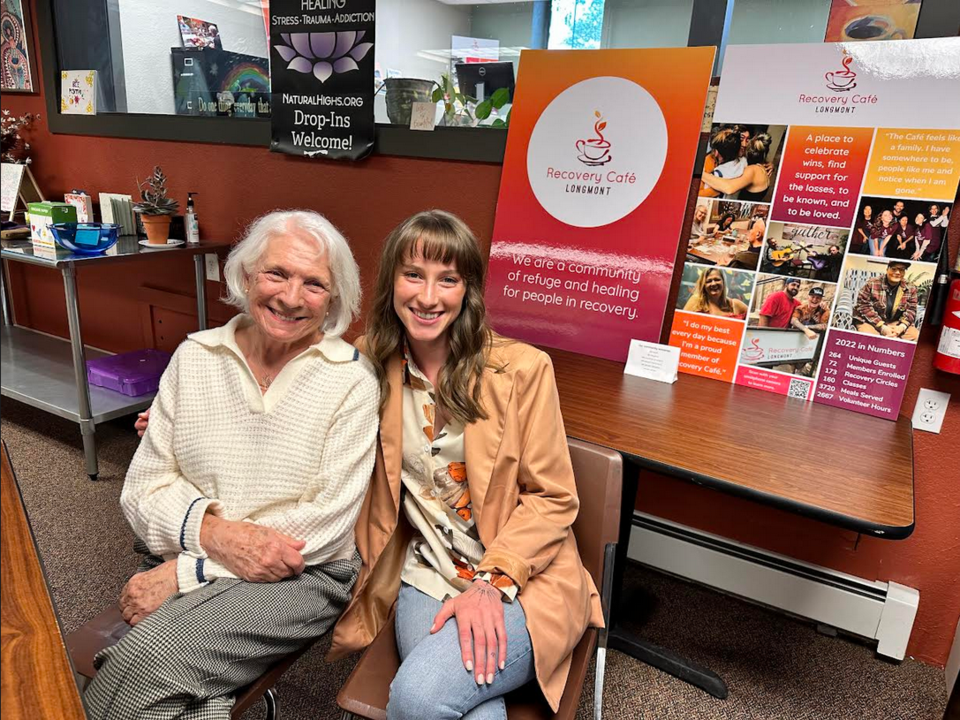Everyone has a story, and a new program at the Longmont Recovery Café aims to help people tell it.
Recovery Café, a nonprofit that provides community and refuge for people in recovery from addiction, has a new workshop focused on the power of storytelling. Elyssa Hamilton, a peer support specialist for the café, and Naomi Plate, a long-term volunteer at the café, are facilitating the workshop in the basement at 402 Kimbark St.
Plate said she has always been interested in other people’s stories, something that only grew when she saw a presentation about the book, “Between the Listening and the Telling” by Mark Yaconelli. It got her more curious about how to ask the right questions and help people feel comfortable telling their stories, and she’s now in the process of becoming a certified “story catcher.”
“I think this is a really amazing tool because we are nothing more than walking stories,” Plate said. “That’s the one thing we all have in common. Even though we’re all unique human beings, we are all still human beings, and we are stories from our foot to our head.”
During her time working for the café, Hamilton has been drawn to the stories of the members. When she heard about Plate’s interest in storytelling, she realized that the format would be perfect for a class at the Recovery Café.
“I was thinking that it would be a great School for Recovery Class — storytelling,” Hamilton said. “How you get to where you are today, how you can share your recovery with the community so that there’s more empowerment and strength in the story of recovery rather than the stigma and sadness and other negative things associated with people in recovery.”
There have been two story groups so far, which center on a “connection question” to help participants practice telling their stories for two minutes, Hamilton explained. The first question asked, “What was the story of a really strong emotion that you felt?” and last week’s was, “What is something that you never thought you would do or be a part of?”
Hamilton said she was struck by a specific line from the book: “Everybody has a story to tell. They’re just waiting for you to ask the right question.”
“We’ve seen that,” she said. “It’s such a healing effect on people.”
Both were surprised by the first workshop, and people’s willingness to be vulnerable, along with the community that the workshop helped to build instantly. For one Recovery Café member who had kept mostly to himself, Hamilton said the first workshop helped him to finally feel comfortable enough to open up and start building roots with the program.
“There’s just such a power of being known in recovery,” she said. “That’s something that tends to isolate you, when you’re living with a substance use disorder, and we have all these parts of us that maybe we’re ashamed of. This is a space where we get to talk about the special memories and get to know each other.”
Participants take turns sharing their stories, though they always have the option to pass. This same type of format will continue on June 15 and 22 and July 14 and 21, before the story formatting workshops in August to help participants pull together their stories.
Those who want to will present their stories for 15 minutes each to a community audience on Sept. 22 and 29.
The two emphasized that agency is an important part of people telling their stories, meaning no one has to present if they don’t want to, and it’s up to each person to decide how they share their stories and what parts.
The workshop is open to Recovery Café members, staff, volunteers and community members at large. Along with giving people agency over their stories, another aim of this class is to help open the eyes of people unfamiliar with recovery to the intricacies of others and their experiences — something Plate has experienced firsthand.
“It helps you to empathize. It stops my judgment. It helps me to want to be involved,” she said. “All those things happen when you finally see them as human beings with a story.”
More information, including times for the workshops, is available on the Recovery Café website.



